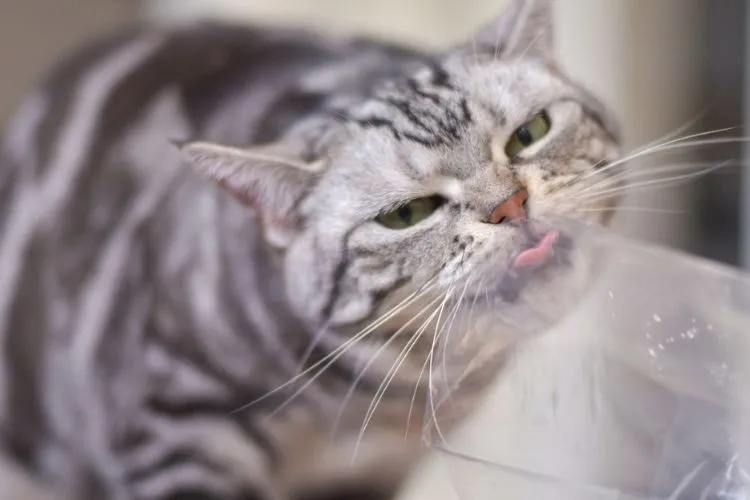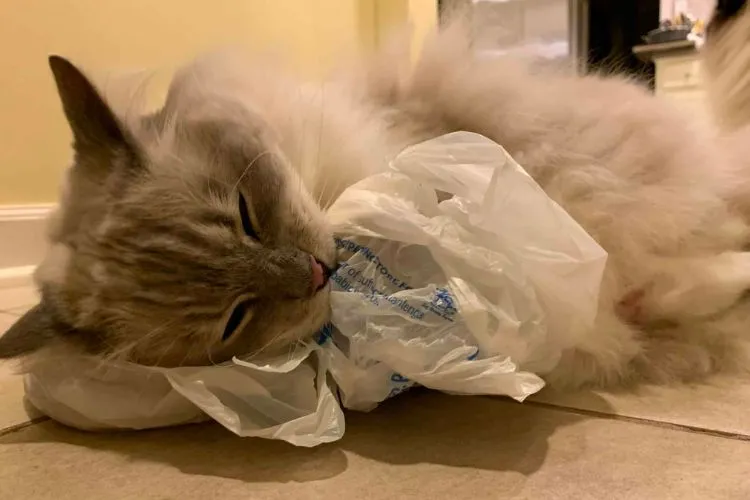If you are a cat owner, you may have noticed your feline friend exhibit some unusual behaviors—one of which might include an unexplainable fascination with licking plastic bags, wrappers, or even shower curtains.
But, do you know why do cats lick plastic?
This intriguing behavior is not uncommon, raising a plethora of questions among those sharing their space with these tenacious creatures.

🐾 Why Do Cats Lick Plastic?
Investigating this enigmatic habit requires a trip down the feline sensory lane. Cats are inherently curious creatures. The textural appeal of plastic—smooth, shiny, and crinkly—offers granules of intrigue.
As they glide their rough tongues over the sheen surface, there’s perceptive satiety—a sensory fulfillment.
The sounds plastic makes when prodded, crinkled, or licked may also mimic the auditory cues usually associated with prey. This could tap into their hunter instincts. In tandem with the tactile experience is the olfactory dimension.
Plastic items, particularly bags, can carry some food odors, especially when used for packaging or carrying edibles. To your kitty, these residual scents may be enticing and create an urge to lick.
Apart from the sensory attraction, the act of licking plastic might be rooted in a recognized disorder in cats, known as pica. Pica is characterized by the compulsion to eat non-food items, and in many instances, can lead to them targeting plastic.
The reasons for pica are variable, encompassing a range of behavioral, environmental, and medical factors.
Additionally, it’s worth noting that certain dietary deficiencies could spark unusual cravings, driving cats to chew or lick plastic and other materials. Lack of sufficient fiber or certain nutrients could lead to these odd tendencies.
🐾 The Risks of Plastic Licking
Though it might seem harmless or just a peculiar quirk, the habit of licking plastic can pose considerable risks to your feline friend. A risk that tops the list is the choking hazard that comes with accidental ingestion.
Tiny pieces could get lodged in your cat’s throat or airways, becoming a serious, life-threatening problem.
Beyond immediate choking risks, ingesting plastic can lead to gastrointestinal blockages. Cats, unlike humans, can’t efficiently vomit any harmful substances they consume. A blockage might warrant surgical intervention—an expensive and stressful ordeal for both you and your pet.
Another risk stems from the plastic’s elemental composition. Certain plastics contain toxic chemicals such as phthalates or even heavy metals. CONTINUED EXPOSURE to these can lead to gradual build-up in your cat’s body, causing long-term health impacts.

🐾 Preventive Measures
Although completely eradicating plastic from your household may not be feasible, there are ways to keep your cat away from this temptation. Providing them with safe chewing alternatives can be an effective strategy.
Pet-friendly chew toys, dental sticks, or interactive treat-dispensing toys can keep them entertained, inoculating against their plastic fascination.
Creating an enriched environment for your cat is another preventive measure. Make sure your cat has access to stimulating activities. Scratching posts, interactive feeders, puzzle toys, and safe outdoor exploration can help divert attention from household items.
When these measures seem insufficient, or your cat displays a severe or worsening case of licking or consuming plastic, professional consultation becomes crucial.
A veterinarian can conduct a thorough check-up, rule out underlying health conditions, and suggest specific behavior modification strategies if necessary.
🐾 Frequently Asked Questions (FAQs)
If you believe your cat has ingested plastic, contact your vet immediately. Symptoms such as vomiting, loss of appetite, lethargy, or changes in bathroom habits could indicate a potential blockage.
Yes, beyond choking hazards and blockages, certain plastics can leach harmful chemicals that can endanger the health of your cat.
While some plastics might be less toxic, it’s better to err on the side of caution and prevent your cat from licking or consuming any type of plastic.
Conclusion:
Unusual as it may be, a cat’s tendency to lick plastic is not entirely unfathomable. Be it sensory exploration, residual odors of edibles, or underlying issues like pica or dietary deficiencies, the causes can be multiple.
However, given the risks involved—choking, blockages, and chemical ingestion—it’s imperative for cat owners to discourage this behavior and take proactive measures.
Regularly monitor your home for accessible plastic items, and keep a record of any behavioral changes for veterinary consultation. By doing so, you can ensure a safer space for your beloved feline friend and keep their natural curiosity satiated sans the plastic.
Remember, a satiated cat is a happy cat. So keep them engaged, happy, and most importantly—healthy!
